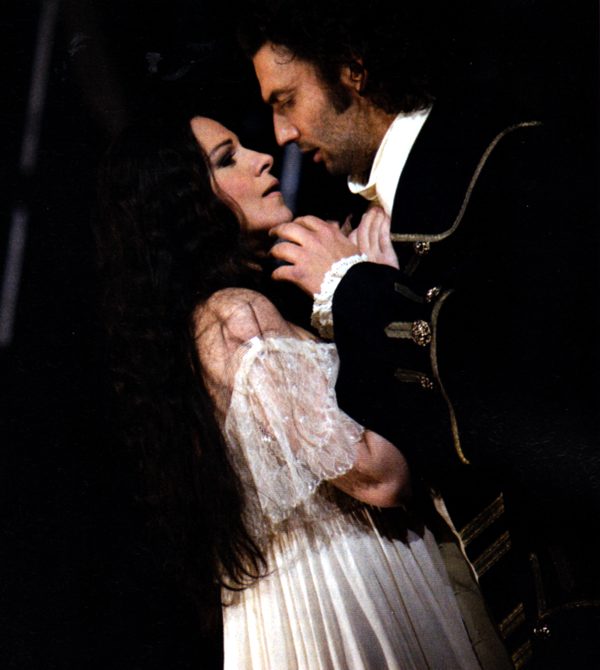|
|
|
|
|
|
|
|
| The Spectator, 25 November 2010 |
| Michael Tanner |
|
|
|
Ciléa: Adriana Lecouvreur, Royal Opera House, 18 November 2010 |
|
|
Conflicting passions
|
 Francesco
Cilea's Adriana Lecouvreur, his biggest success, dating from 1902, leads a
fringe existence, but it persists thanks primarily to the name role,
dramatically meaty and not imposing too great a strain on the performer. It
has been mainly associated with singers at a fairly late stage - or thinking
they were - of their career, Magda Olivero and Renata Tebaldi being the most
notable. What is undeniable is that it is a vehicle, primarily for the prima
donna, but to a lesser extent for her mezzo rival, the Princesse, and for
the object of their affections, the tenor role of Maurizio Count of Saxony. Francesco
Cilea's Adriana Lecouvreur, his biggest success, dating from 1902, leads a
fringe existence, but it persists thanks primarily to the name role,
dramatically meaty and not imposing too great a strain on the performer. It
has been mainly associated with singers at a fairly late stage - or thinking
they were - of their career, Magda Olivero and Renata Tebaldi being the most
notable. What is undeniable is that it is a vehicle, primarily for the prima
donna, but to a lesser extent for her mezzo rival, the Princesse, and for
the object of their affections, the tenor role of Maurizio Count of Saxony.
The Royal Opera's programme book, for the first production there since
1906, doesn't stint on pointing out that it is a theatrical work about
theatre people, and the production itself doesn't allow us to overlook that
very obvious point either. It would hardly be worth mentioning if it weren't
for the distorting way in which this production makes the work end: the
heroine has been sent violets by her rival, she kisses them, they are
poisoned and she dies in the arms of Maurizio, after a moderately protracted
aria in which she identifies herself with the Muse of Tragedy.
That
takes place in this production behind the scenes at the Comedie Française
(at Adriana's house in the text), so the actors on the onstage stage walk to
the back of it and applaud her death. That does seem to be taking things too
far, and is the only emphatic piece of directorial intrusion by David
McVicar. Otherwise the production, with elaborate set designs by Charles
Edwards, which are going round Europe and to San Francisco, is a
straightforwardly naturalistic affair, though it is sometimes inept, and
often wildly hyperactive. The opening scene is a depiction of hectic
backstage life just before a performance, but here Adriana doesn't make an
entrance, but is sitting in her chaotic dressing-room, so the combination of
imperiousness and humility that should characterise her is undermined.
Angela Gheorghiu's Adriana is, or anyway was on the first night, a
disappointment. Her opening lines were so softly sung as to be almost
inaudible, and for most of the opera she seemed to be feeling her way with
care, so one had no sense of what I take to be the heart of the character, a
great tragic actress whose life is out of control. In ensembles,
especially the several love duets with Maurizio, she sang out more fully,
presumably thanks to the confidence that Jonas Kaufmann, her Maurizio,
radiates. He seems to ignite her whenever they perform together, and he is
indeed an incandescent artist, in this case making a role which wouldn't
seem to offer much room for development into something interestingly
complicated, Maurizio trying to find his way through the tangle of
conflicting passions and political demands.
Her rival the
Princesse was also very strongly taken by Michaela Schuster, though she,
too, was hampered in Act II by the production, in which the rivals for
Maurizio's love fail to recognise one another: here it was inconceivable
that they should fail, since they were singing virtually nose-to-nose. One
is used to absurdities of this kind in Italian opera, especially in Verdi,
but, again, there is a limit. The sad fourth main character, the stage
manager who is futilely in love with Adriana, was brilliantly portrayed by
Alessandro Corbelli.
The whole thing was evidently the product of
immense pains, with Mark Elder conducting with such care that it might have
been Pelléas. I often feel with these rumbustious early 20th-century
so-miscalled verismo scores that something of the old-style Italian
approach, which might seem slapdash but had abandon and urgency, would pay
more rewards than this lavish devotion.
|
|
|
|
|
|
|
|
|
|
|
|
|
|
|
|
|
|
|
|
|